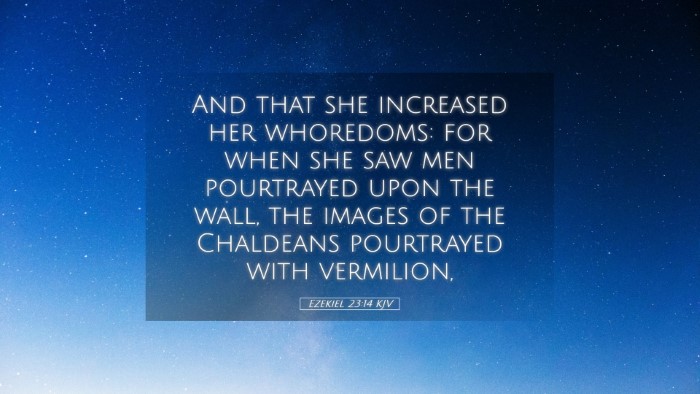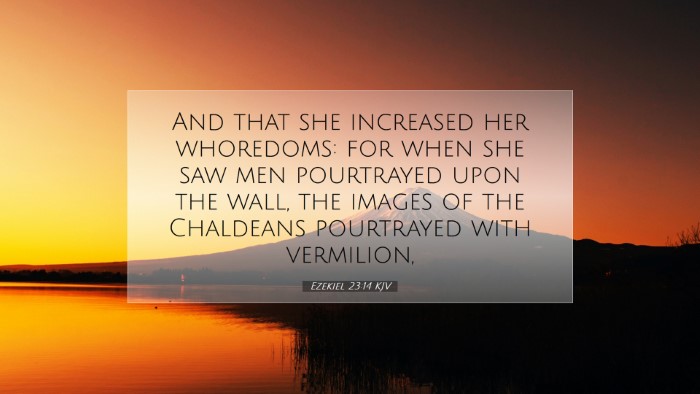Ezekiel 23:14 Commentary
Bible Verse: "And that she increased her whoredoms; for when she saw men portrayed upon the wall, the images of the Chaldeans portrayed with vermilion," (Ezekiel 23:14, KJV)
Introduction
This verse occurs within a vivid and symbolic narrative found in Ezekiel 23, which presents a parable of two sisters, Oholah and Oholibah, representing Samaria and Jerusalem, respectively. The imagery used by the prophet Ezekiel serves to illustrate the spiritual unfaithfulness and idolatry of God's people in the face of the alluring temptations from surrounding nations. This commentary synthesizes insights from various public domain commentaries, providing a profound exploration of this verse's implications for understanding sin, idolatry, and God's call to repentance.
Contextual Analysis
Historical Context: Ezekiel prophesied during the Babylonian exile. The people of Israel were deeply influenced by the cultures around them, especially the Chaldeans. The imagery here, regarding the engraving of Chaldeans upon the wall, signifies the seductive allure of foreign nations and the spiritual adultery of Israel.
Moral and Spiritual Implications: The reference to "whoredoms" encapsulates the idea of Israel's infidelity to Yahweh. This spiritual unfaithfulness is not merely physical but represents a deeper betrayal of covenant relationships. The prophet depicts idol worship and reliance on foreign powers as acts of spiritual adultery.
Insights from Commentaries
- Matthew Henry:
Henry interprets this verse through the lens of Israel's deepening corruption. He emphasizes that viewing the "images of the Chaldeans" denotes the engagement of Israel in the worship of foreign gods. It showcases the progression of Israel's sin, from mere observation to active participation. Henry notes that the representation of these idols signifies vulnerability—Israel is distracted and led away from true worship.
- Albert Barnes:
Barnes elucidates the nature of the "images" that are portrayed. He underscores that these images invoke a sense of attraction and desire that leads to horrific disloyalty before God. He indicates that the increasing whoredoms reflect a loss of spiritual integrity and warns against the dangers of being seduced by the world. Barnes calls upon readers to examine how contemporary society may similarly pull individuals away from God through its alluring but empty promises.
- Adam Clarke:
Clarke provides an extensive theological exploration of the implications encapsulated in this verse. He notes that the “increase” of whoredoms illustrates a profound movement away from God. Clarke elaborates that the representations on the wall symbolize the temptations that surround the faithful. He stresses that spiritual degradation is often gradual and cautions believers against complacency. It serves as a reminder of the necessity of vigilance and discernment in a time of external pressures.
Thematic Considerations
Idolatry and Spiritual Adultery: Ezekiel’s vivid language captures the devastating impact of idolatry, revealing that the infidelity of the people is akin to a spouse being seduced. This theme of adultery metaphorically represents the breach of covenant with God. The allure of the Chaldeans symbolizes all that draws the heart away from divine fidelity.
The Nature of Temptation: The implications of the “images” reflect how temptation often comes through appealing representations, enticing believers to stray from their allegiance. This illustrates humanity's tendency to be led astray by visible, enticing representations of sin that can appear harmless or even desirable.
Call to Repentance: Central to Ezekiel's prophecies is the call to repentance. This verse, while depicting sin's severity, simultaneously challenges readers to turn back to God. The recognition of sin is the first step toward redemption and restoring covenant fidelity.
Conclusion
Ezekiel 23:14 serves as a critical reminder to contemporary believers about the dangers of spiritual complacency and idolatry. The rich insights from the public domain commentaries elaborate on the need for vigilance against external seductions that threaten one’s relationship with God. In a world that often prioritizes fleeting pleasures, the faithful are called to a deeper commitment to their covenant with the Lord, recognizing that true fulfillment comes only through a devoted relationship with Him.


